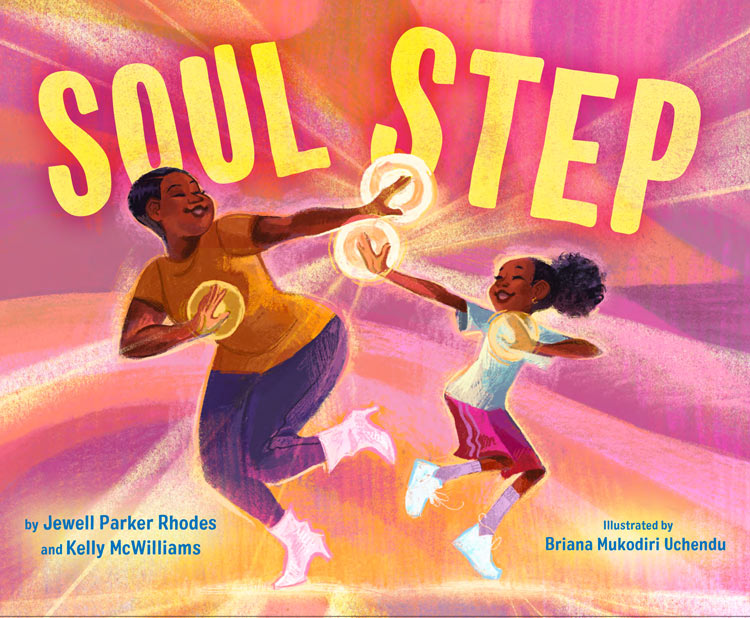Go Hard, Snap Back!
Soul Step!

Soul Step - On Sale now
By Jewell Parker Rhodes and Kelly McWilliams, illustrated by Briana Mukodiri Uchendu
Ages 4 – 8
What does sisterhood sound like?
STOMP,
CLAP!
How does pride move?
FLIP,
FLAP!
How do we uphold tradition?
GO HARD,
SNAP BACK!
SOUL STEP!
Mother-daughter team Rhodes and McWilliams feature a mother-daughter duo in this energetic picture book rooted in the history of step. “Where me and Mama live, not many people look like us. Sometimes that makes Mama sad as can be,” begins the young Black narrator. When Mama’s stopped twice by cops who ask “if she lives in the neighborhood,” Mama dons her dancing boots and “gets to what she calls ‘steppin.’ ” Trying to learn more, the protagonist visits Mama’s sorority sister, who says “steppin’s roots go all the way back to slavery, but step didn’t pop until sisters and brothers went to college.” Other women in Mama’s life further define step as “sisterhood” and “a megaphone for our resistance.” Asked why it helps with frustration, Mama herself finally walks her child through the moves (“First, catch the rhythm. Feel it in your soul”).
In a striking color palette, Mukodiri Uchendu depicts the narrator seeking knowledge from Mama’s close circle—an act that underlines the book’s high-level exploration of Black culture, sisterhood, and step.
Honors
2024
Finalist, Black Authors Matter Children’s Book Award
National Black Book Festival
2024
Best Books for Children Ages 3 – 5
Amazon
Praise
“Mother-daughter team Rhodes and McWilliams feature a mother-daughter duo in this energetic picture book rooted in the history of step… In a striking color palette, Mukodiri Uchendu depicts the narrator seeking knowledge from Mama’s close circle—an act that underlines the book’s high-level exploration of Black culture, sisterhood, and step.”
Booklist
“Celebrating Black history and sisterhood, this story brings awareness to an art form rarely performed outside of African American communities. Like step, this tale should be enjoyed and shared… Uchendu’s digitally created illustrations convey a sense of perpetual motion.”
Horn Book
“Mother-daughter team Rhodes and McWilliams feature a mother-daughter duo in this energetic picture book rooted in the history of step. “Where me and Mama live, not many people look like us. Sometimes that makes Mama sad as can be,” begins the young Black narrator. When Mama’s stopped twice by cops who ask “if she lives in the neighborhood,” Mama dons her dancing boots and “gets to what she calls ‘steppin.’ ” Trying to learn more, the protagonist visits Mama’s sorority sister, who says “steppin’s roots go all the way back to slavery, but step didn’t pop until sisters and brothers went to college.” Other women in Mama’s life further define step as “sisterhood” and “a megaphone for our resistance.” Asked why it helps with frustration, Mama herself finally walks her child through the moves (“First, catch the rhythm. Feel it in your soul”). In a striking color palette, Mukodiri Uchendu depicts the narrator seeking knowledge from Mama’s close circle—an act that underlines the book’s high-level exploration of Black culture, sisterhood, and step.”
Publisher’s Weekly
“In this collaboration from mother-daughter team Rhodes and McWilliams, a Black girl learns about step dancing.
The young narrator and her mom live in a neighborhood where “not many people look like us.” Mama’s disheartened when she’s racially profiled by police, but she channels her pain into steppin’. What’s that? A series of family friends fill the child in. One of Mama’s sorority sisters, Dr. Jameson, tells her that step is rooted in the history of slavery, but it really took off when Black college students formed their own fraternities and sororities. Aunt Sharifa confides that for her, step was both a way to find solace as a bullied child and to celebrate big wins. Miss Mae, a community organizer, tells the child that step is “a megaphone for resistance.”Above all, the protagonist realizes, step is an expression of strength and solidarity in difficult times. The tale ends with the child joining a step team and finding her own sisterhood Rhodes and McWilliams have crafted a lively, rhythmic narrative, punctuated by onomatopoeia, that will have readers chanting along: “STOMP, CLAP, FLIP, FLAP, GO HARD, SNAP BACK!” Fluid illustrations accompany the text, which balances the heartache Black women and girls face with the triumph of sisterhood.Backmatter offers more information on step’s origins and continuing influence.
A joyful tribute to the ways in which Black women use culture and connection to both survive and thrive. “
Kirkus